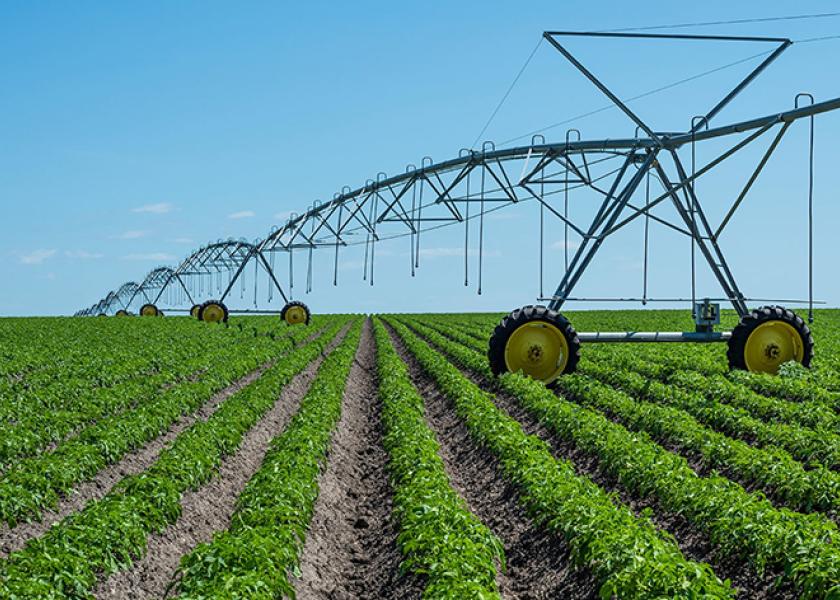PepsiCo and Walmart collaborate to invest $120M in regenerative ag

PepsiCo and Walmart have announced a seven-year collaboration to pursue $120 million worth of investments focused on supporting U.S. and Canadian farmers in their effort to improve soil health and water quality, according to a news release.
By establishing and scaling financial, agronomic and social programs, the companies aim to enable and accelerate the adoption of regenerative agriculture practices on more than 2 million acres of farmland and deliver approximately 4 million metric tons of greenhouse gas emission reductions and removals by 2030 — roughly equivalent to the amount of electricity needed to power 778,300 homes for one year, the release said.
“From my perspective, embracing regenerative agriculture is essential,” Jeff Huffman, owner and operator of the Maxwell, Neb.-based Island Farms LLC, said in the release. “It’s good for farmers, not only because it’s beneficial to the environment and our food quality, but also for the profitability of our businesses. If you use less fertilizer and you grow a bigger crop, or if you use less water and can still grow the same size of crop, it strengthens your farm in a way that benefits the bottom line and our environment for generations to come.”
PepsiCo’s and Walmart’s businesses are dependent on farmers to grow ingredients that are used to make products consumers enjoy every day. With a supply chain for the two companies that stretches across North America and involves a large volume of critical crops — including potatoes, oats, corn, wheat, soybeans and rice — sustainability will look different from commodity to commodity, region to region and even farm to farm, the companies say.
The collaboration between PepsiCo and Walmart offers a voluntary, flexible approach to regenerative agriculture that gives farmers a seat at the table, recognizes the diversity of agriculture and that one size does not fit all, the release said.
“Successful sustainability starts and ends with trust. At PepsiCo, we work very hard to earn the trust of the farmer so they understand that we are investing in their legacy, and they can hand their farm down to the next generation,” Jim Andrew, chief sustainability officer for PepsiCo, said in the release. “Farmers know their business better than anyone else, and what we hear from them is that for regenerative agriculture to make business sense, three things need to happen. They need economic support, social and cultural support, and agronomic support. This strategic collaboration with Walmart will advance our shared goal to have farmers’ backs as they transform farming in a way that benefits the planet and people.”
PepsiCo and Walmart have a shared focus on supporting farming communities while improving soil and water health, as well as lowering carbon emissions, the release said.
“At Walmart, our sustainability strategy is built to make the everyday choice the sustainable choice for our customers,” Jane Ewing, senior vice president for sustainability for Walmart, said in the release. “This collaboration with PepsiCo is a great example of how we are prioritizing the expansion of regenerative agricultural practices among farmers across North America so that we can continue to make quality products affordable and accessible for customers. This collaboration aims to help elevate farmer livelihoods, engage them on how to more sustainably manage soil health, increase yields and create a model that others can mimic across other product categories, including encouraging additional investments in regenerative agriculture by other brands.”
Related: Walmart, industry leaders aim to reduce carbon emissions
As the largest convenient food and beverage company in North America, a resilient food system is essential to the Purchase, N.Y.-based PepsiCo's business and its ability to meet its ambitious pep+ (PepsiCo Positive) goals, which include driving the adoption of regenerative agriculture practices across 7 million acres by 2030 — an area approximately the size of PepsiCo's agricultural footprint — and reducing absolute GHG emissions by more than 40% across its entire value chain by 2030, against a 2015 baseline, while striving toward net-zero emissions by 2040.
“This effort is a new model for PepsiCo, marking our first large-scale strategic collaboration focused on sustainable agriculture with a retail partner,” Steven Williams, CEO for PepsiCo Foods North America, said in the release. “Farmers are critical to our business, and many of the brands our consumers know and love rely on ingredients that we source straight from the farm. By joining forces with Walmart, we’ll be empowering farmers through education, upfront investment in outcomes, peer coaching and cost-sharing — and hopefully inspiring others to join us.”
This effort is an example of how the Bentonville, Ark.-based Walmart is “prioritizing purposeful collaborations” to accelerate the adoption of regenerative practices in line with its goal to protect, restore or more sustainably manage 50 million acres of land and 1 million square miles of ocean by 2030 along with the Walmart Foundation, according to the release.







